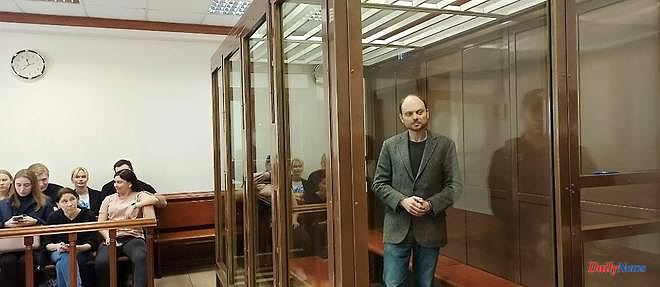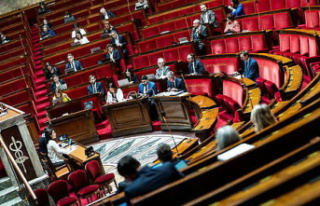A Moscow court on Monday sentenced opponent Vladimir Kara-Murza to 25 years in prison, a judgment of rare severity which illustrates the relentless repression in Russia against those who criticize the offensive in Ukraine.
The sentence handed down to Mr. Kara-Murza, who was one of the last major Kremlin critics not to be behind bars or exiled abroad, is the heaviest imposed on an opponent in recent Russian history.
After a trial behind closed doors, the court announced that it recognized the opponent guilty of “high treason”, spreading “false information” about the Russian army and illegal work for an organization “ undesirable", according to an AFP journalist.
As a result, he was sentenced to a cumulative term of 25 years in a harsh regime penal colony, implying stricter incarceration conditions. Either what the prosecution had requested.
Handcuffed in the cage reserved for the defendants and wearing blue jeans, a black t-shirt and a gray jacket, the 41-year-old Russian opponent welcomed the sentence with a smile, before enjoining his supporters with gestures write in jail.
It is "just a political revenge" and he "is a political prisoner, there is no doubt about it", commented his lawyer Vadim Prokhorov, from Washington.
Imprisoned Russian opponent Alexei Navalny, meanwhile, called the judgment "illegal, shameless, simply fascist".
This condemnation has also sparked outrage in Western countries.
Washington castigated an "intensified campaign of repression" and a condemnation having a "political motive", the European Union castigating for its part a "scandalously harsh" sentence and an "abuse of judicial power".
France said it was "dismayed", Germany denouncing with "the greatest firmness" a judgment aimed at "preventing any critical voice", while the UN High Commissioner for Human Rights and London demanded "the immediate release" of Mr. Kara-Mourza, who also has British nationality.
In the evening, Moscow castigated "direct interference" from London "in (s) its internal affairs", seeing it in particular as "an attempt to put pressure on the Russian judicial system".
Earlier, Maria Eismont, one of Mr. Kara-Mourza's lawyers, had announced that Mr. Kara-Mourza would appeal. "It's a terrible verdict but it illustrates the great value of Vladimir's action," she said, saying her client remained in a "valiant" mood and "sincerely believed that he had acted for the good of the community. Russia".
His mother, Elena, for her part, deplored a "brazen" and "absurd display of injustice".
In his last statements on April 10, broadcast by journalist Alexei Venediktov, Vladimir Kara-Mourza said he was "proud" of his political commitment.
"I also know that a day will come when the darkness that covers our country will dissipate (...) when those who provoked and started this war (in Ukraine) will be called criminals and not those who tried to stop it “, he had said again.
In pre-trial detention since April 2022, Mr. Kara-Mourza almost died after being, according to him, poisoned twice, in 2015 and 2017, assassination attempts which he attributes to Russian power.
According to Me Vadim Prokhorov, the opponent suffers from polyneuropathy and neuromuscular pathology, a consequence of the two poisonings. His supporters are worried about his worsening health due to his detention.
According to the Russian news agency TASS, Mr Kara-Mourza, who was declared a "foreign agent" by the authorities, was accused of "high treason" for having criticized the power in public interventions in the West .
He has notably pleaded in the United States, Europe and Canada for the adoption of sanctions against Russian officials who are guilty of serious human rights violations, like the "Magnitsky law" passed in 2012.
The opponent also worked for the Open Russia organization of the ex-oligarch in exile and detractor of the Kremlin Mikhail Khodorkovsky, deemed "undesirable" by the Russian authorities in 2017.
The charge of spreading “false information” about the army is based on an amendment introduced after the start of the offensive against Ukraine, which makes it possible to repress any information considered to be false by the authorities .
In recent years, almost all Russian opponents have been sentenced to heavy prison terms or had to flee their country.
Best known, anti-corruption activist Alexei Navalny, is serving a nine-year prison sentence for fraud, a case widely seen as political. He was arrested in 2021 upon his return to Russia, after recovering from poisoning of which he accuses the Kremlin.
04/17/2023 20:48:40 - Moscow (AFP) - © 2023 AFP












